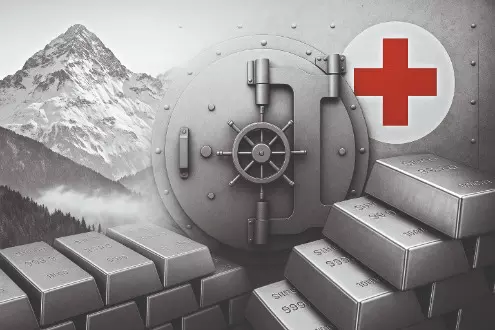The Swiss Paradox
Switzerland’s global reputation for order and peace masks a history of pragmatism, profit, and moral compromise — a testament to the quiet genius of national self-preservation

René Descartes once observed: “The power of judgment, which is called ‘reason’ or ‘good sense,’ is equally distributed in all of us from birth… What sets us apart is how we utilise it.” If any nation embodies this principle to perfection, it is Switzerland. Globally admired for its chocolate, watches, and Alpine charm, the country is also a striking case study in deploying reason for virtue and gain. Switzerland’s global image is one of pristine order and discreet competence. It is the land of neutrality, direct democracy, and efficient trains. But dig deeper, and another narrative emerges—strategic ambiguity, financial opportunism, and moral flexibility converge to shape what can only be described as national genius.
During the Second World War, Switzerland declared neutrality. This status allowed it to become a financial haven, not just for persecuted Jews, but also for Nazi Germany. Swiss banks attracted deposits from Jews fleeing persecution, often under secrecy. Yet while many refugees were turned away at the border, their assets were quietly accepted. Worse still, Switzerland became a conduit for Nazi loot—gold stolen from occupied countries, melted down and laundered through the Swiss National Bank. Much of it came from central banks, private holdings, and even the teeth of Holocaust victims. It is estimated that over $500 billion in plundered assets passed through Swiss institutions in today’s terms.
After the war, the Allies demanded restitution. However, Swiss authorities leveraged their legal frameworks and bureaucratic rigidity to retain much of the wealth. The 1946 Washington Agreement was hailed as a diplomatic success for Switzerland, allowing it to keep a significant portion of the assets while offering only partial compensation. Holocaust survivors and their heirs often faced decades of legal and political hurdles to reclaim even a fraction of what was lost. What separates Switzerland is what it did and how it got away with it. The enduring image of Swiss innocence—a land of cowbells, neutrality, and snowy tranquillity—has shielded it from the full force of international scrutiny. For years, the very idea that such a tidy and tranquil country could be involved in profiting from genocide or war profiteering was unthinkable. This national branding is no accident. Switzerland has mastered the art of soft power and strategic self-presentation. Its tourism campaigns, its role as a diplomatic hub, and its emphasis on humanitarianism have all helped construct a global perception that belies its darker economic entanglements. This, too, is a form of genius—turning global trust into capital.
Switzerland’s famed neutrality is often cast in moral terms, but it has historically served as a shield for economic opportunism. During both world wars, the country avoided invasion not merely through military readiness but also its value to all sides as a banker and broker.
Switzerland turned neutrality into a thriving industry by positioning itself as a safe space for assets, capital, and negotiation. Countries at war entrusted it with their gold and cash. In return, Swiss banks collected fees, interest, and deposits. Unlike neutral countries invaded or coerced, Switzerland ended the war intact and wealthier. This neutrality was anything but passive. It was strategic, calculated, and profitable.
Despite its peaceful image, Switzerland maintains one of the most heavily armed citizenries in the world. Every adult male undergoes military training, and the mountainous terrain is dotted with hidden bunkers, airfields, and fortifications. The nation’s military doctrine is based on defence and deterrence. Swiss arms manufacturers are another little-discussed facet of its pragmatism. Over the years, Swiss weapons—tiny arms and ammunition—have found their way into conflicts from Yemen to Syria. In this context, neutrality does not mean disengagement from violence; it means profiting from all sides while remaining politically aloof. Switzerland is a paradox: a nation whose reputation rests on purity and peace, yet whose prosperity owes much to its ability to profit from chaos. It is not a criminal state, but a brilliantly self-interested one. Its genius lies in knowing when to act, hide, and maintain a façade that is almost impossible to criticise.
What other country could house the Red Cross and also hoard Nazi gold? What other nation could claim neutrality while exporting arms to war zones? What other people could turn bureaucracy into a fortress of financial protectionism? The answer, again and again, is Switzerland. Switzerland’s most remarkable achievement may not lie in its vaults, chocolates, or watches but in its ability to convince the world that it is precisely what it appears to be while being something far more complex beneath the surface.
Views expressed are personal.
THE WRITER WRITES ABOUT POLITICS, MATERIAL CULTURE, AND ECONOMIC HISTORY



